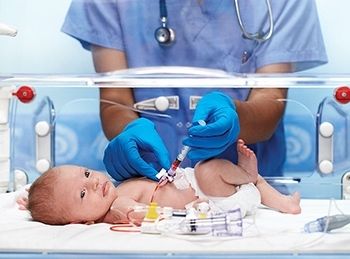

Research by Brazilian scientists shows that emotional development of children born preterm should be evaluated as much as physical growth and motor skills (photo: Calleamanecer / Wikimedia)
Research by Brazilian scientists shows that emotional development of children born preterm should be evaluated as much as physical growth and motor skills.
Research by Brazilian scientists shows that emotional development of children born preterm should be evaluated as much as physical growth and motor skills.

Research by Brazilian scientists shows that emotional development of children born preterm should be evaluated as much as physical growth and motor skills (photo: Calleamanecer / Wikimedia)
By Maria Fernanda Ziegler | Agência FAPESP – A baby is born sooner than expected. It must go immediately to the neonatal ICU if it is to survive. Its lungs are not fully developed, so it is intubated within minutes. The equipment shows a strong heartbeat, but a number of procedures, some of which are painful, are still required to ensure that the newborn gains weight and survives.
This situation is common, particularly in Brazil, which has the world’s tenth-highest rate of premature births, according to the World Health Organization (WHO). It is also paradoxical in the sense that while the neonatal ICU is highly stressful for babies, premature infants cannot survive without the support of the equipment and the multiprofessional team of specialists found there.
According to a study conducted by researchers at the University of São Paulo’s Ribeirão Preto School of Medicine (FMRP-USP) in Brazil, and supported by FAPESP, length of stay in the ICU is the factor that best explains some preterm babies’ behavioral problems relating to emotional regulation, regardless of the degree of prematurity and the presence of bronchopulmonary dysplasia and retinopathy of prematurity (ROP).
The researchers say this finding confirms the need for developmental care programs in ICUs to reduce stressful and painful experiences for newborn infants and also to enhance protective strategies during their early development.
The sample population consisted of 100 preterm babies aged 18-36 months with differing levels of prematurity. The aim of the study was to find out how neonatal and socio-demographic factors influence early-childhood temperament and behavior.
All the infants were born in FMRP-USP’s hospital and enrolled in a multidisciplinary intervention program in its neonatal ICU. A number of tests were applied to evaluate temperament, stress and behavior, leading to scores for the relevant indicators.
Mothers of these babies who met the criteria for inclusion, which included understanding the instrument used to report their infant’s behavior, participated in interviews and responded to questionnaires.
Babies with grade 3 or 4 intracranial hemorrhage, limited mobility or cognitively impaired mothers were excluded. Thirty-six had bronchopulmonary dysplasia, and 63 had ROP, the most common diseases among preterm babies.
“Previous studies compared preterm and term babies, given that preterm babies are more likely to display behavioral problems. Our study advances knowledge of development in preterm babies. There are risks, but if we identify the risks, we can plan strategies for protection, prevention and intervention to improve the development of these children,” said Rafaela Guilherme Monte Cassiano, a psychologist and PhD researcher in FMRP-USP’s Department of Neurosciences & Behavioral Sciences and one of the authors of the study published in the journal Early Human Development.
Neonatal pain and stressful experiences can impair both early and later child development, according to the study. Moreover, the neonatal ICU environment includes other factors that impair child development, such as high levels of noise and luminosity, repetitive tactile stimuli, and maternal separation.
Window of opportunity
According to Maria Beatriz Martins Linhares, an associate professor at FMRP-USP and principal investigator for the study, early childhood is a window of opportunity for regulation of the individual’s lifelong development.
“Initial physiological and emotional regulation lays a foundation for several behavioral regulation processes,” she said. “For this reason, it is important to recall that neonatal and childhood behavioral problems can point to the risk of behavioral problems in adulthood. These can potentially be prevented in the window between birth and about six years of age.”
The self-regulation process is completed by the age of five, starting with emotional regulation up to the age of approximately 18 months and followed by behavioral regulation.
“Self-control emerges at around three or four years of age, with development of the executive attention system, which is relevant to effortful control, enhancing the potential for behavior regulation,” the authors write.
Temperament changes during the course of development. With typical child development, therefore, “systems that are initially more reactive become increasingly regulated to the extent that the inhibition control systems directed toward fear and attention control become more mature”, according to the authors.
The researchers’ study of 100 preterm babies showed that longer stays in the neonatal ICU were a risk factor for behavioral problems.
“Development involves physical growth and language and motor skills and also has affective, social and behavioral aspects,” Linhares said. “Not only motor development but also behavioral indicators and temperamental traits should be monitored.”
Republish
The Agency FAPESP licenses news via Creative Commons (CC-BY-NC-ND) so that they can be republished free of charge and in a simple way by other digital or printed vehicles. Agência FAPESP must be credited as the source of the content being republished and the name of the reporter (if any) must be attributed. Using the HMTL button below allows compliance with these rules, detailed in Digital Republishing Policy FAPESP.





